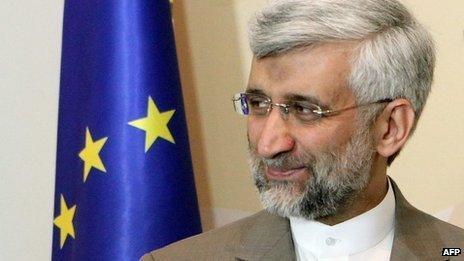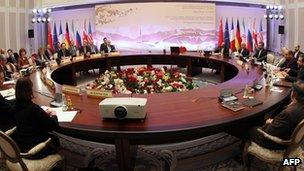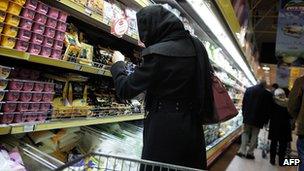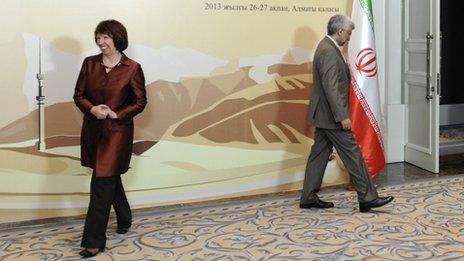Nuclear talks: New approach for Iran at Almaty
- Published

Saeed Jalili said the talks had been "more realistic" than in the past
Iran's chief nuclear negotiator Saeed Jalili hailed the talks as a possible "turning point," while a senior US official just labelled them "useful".
So wide are the gaps between Iran and world powers on Tehran's nuclear programme, the two sides couldn't even agree on what happened here.
But something did happen in this week's talks in the Kazakh city of Almaty.
Whether it will be of real consequence in a decade-long effort to deal with Iran's controversial nuclear programme will only become clear in the months ahead.
One of the few phrases used by both sides was: "There is still a long way to go."
But there is, at the very least, some rare momentum in a process long bogged down by Western demands, Iranian defiance, and the sheer difficulty of knowing exactly how far Iran has advanced in a nuclear programme it describes as entirely peaceful, and the world fears is not.
This time the six nation bloc put a revised offer on the table. EU Foreign Policy Chief Catherine Ashton called it "a balanced and fair basis for constructive talks".
Iran, in a first written statement issued after talks of this kind, called some of the new points "more realistic… and positive".
When I showed a Western diplomat the page handed out to journalists, he cast a sceptical eye across Iran's new language. "We have to wait and see if this is just tactical or substantive."
Sanctions relief
But Iranian diplomats told me this round was "better" than past ones.

The talks involved Iran, the US, UK, France, China, Russia and Germany
The stark "Stop, Shut, Ship" proposal is gone. This was the demand that Iran stop its 20% enrichment of uranium, shut its underground nuclear facility at Fordow, and ship its enriched fuel out of the country to ease international concern that it is developing nuclear weapons capability.
A senior US official said the new offer allows Iran to produce and keep a small amount of enriched uranium for use in a research reactor. It calls for a suspension of enrichment at the Fordow facility, with additional safeguards to make it hard to resume operations.
And for the first time, there is explicit mention of limited sanctions relief including a relaxation of a ban on trade in gold and other precious metals, as well as an easing of an import embargo on Iranian petrochemical products.
And there's a pledge to refrain from new sanctions.
Mr Jalili told a press briefing: "They mentioned some steps, but these steps should be balanced... Their reaction was more realistic. They tried to get closer to our viewpoint."
But Western officials were quick to insist they hadn't "softened their position".
"The absolute bottom line is Iran must address concerns about 20% enrichment and Fordo," emphasised a US official.
The most punishing banking sanctions and an oil embargo remain in place. And there are demands for more intrusive inspections by the International Atomic Energy Agency (IAEA) which recently reported that Iran had installed more advanced centrifuges at its Natanz nuclear facility.
Different tactics
Mr Jallli reiterated Iran's view it had a right to enrich uranium, to whatever level it needed, but he hinted that could be discussed as part of a package of reciprocal confidence building measures.

The Iranian economy has suffered under sanctions
The sceptics, who suspect Iran is just stalling for time, saw some clever spinning for domestic political consumption.
"Maybe they are trying to send some positive signals in the run-up to Nowruz," remarked one Western diplomat, referring to the Persian New Year celebration on 21 March.
Reuters reported that the Iranian rial, which lost more than half its foreign exchange value in the last year as punishing sanctions took effect, rose 2% after the talks ended.
"All my friends have been emailing and texting me from Tehran," one Iranian journalist covering the talks told me. "Sanctions are very personal for everyone."
And there is also the backdrop of presidential elections set for June. Iran's official news agencies presented the new offer on the table as a response to Iran's own proposals in Moscow last year.
"Of course we need to present this as our success," remarked another Iranian journalist, "but there was also something positive in the meetings."
'Concrete steps'
Whatever Iran's long term strategy is, its delegation came to Almaty with different tactics.
New dates and venues for talks were agreed immediately over two days of meetings. In the past, even that could take months.
Technical experts will meet next month in Turkey to look at the revised proposal in detail. Then there will be another round of political talks in Almaty in early April.
This time, Iran briefed the press first, and without the banners they've hung at previous talks of their nuclear scientists they accuse the West and Israel of assassinating in a covert effort to disrupt Iran's programme.
Western diplomats were less impressed by atmospherics. "What matters are concrete results," underlined a US official.
A Western source said a Powerpoint presentation showed to the Iranians in Almaty was not a road map, nor a "you do this, and we will do that".
Bt it did offer both short and long term proposals which Mr Jalili also noted positively.
"For the EU, which chairs the talks, there is only a diplomatic solution," EU spokesman Michael Mann emphasised when I asked whether the threats of military action entered the talks in any way.
"But Iran has to take concrete steps to reassure the international community their nuclear programme is entirely peaceful. The IAEA points to some really serious doubts."
"The ball is now in Iran's court," he emphasised.
But, after this latest round, both sides are still trying to figure out what game the other is playing.
- Published27 February 2013
